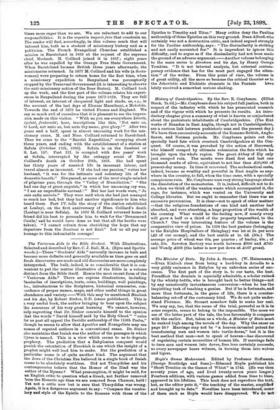The Variorum Aids to the Bible Student. With Illustrations. Selected
and described by Rev. C. J. Ball, M.A. (Eyre and Spottis woode.)—These "Students' Aids" naturally increase in bulk and become more definite and generally available as time goes on and fresh discoveries are made and old discoveries are more completely interpreted. The bulk, indeed, is so considerable that it is con- venient to put the matter illustrative of the Bible in a volume distinct from the Bible itself. Hence the most recent form of the "Variorum Aids." There are copious illustrations, including facsimiles of inscriptions, texts, coins, buildings, wall paintings, ic., introductions to the Scriptures, historical summaries, con- 2ordance of proper names, maps, and other useful things in great abundance and variety.—With this may be mentioned Hezekiah and his Age, by Robert Sinker, D.D. (same publishers). This is a very useful book, the author bringing to bear upon the subject the resources of his very great learning We cannot, however, help regretting that Dr. Sinker commits himself to the opinion that the words "David himself said by the Holy Ghost" "rules for us past all appeal the Davidic authorship of the 110th Psalm," though he seems to allow that Apostles and Evangelists may use names of reputed authors in a conventional sense. Dr. Sinker also maintains that Isaiah was the author of the passages in which Cyrus is named. This is a view which seems to us to degrade prophecy. The prediction that a Babylonian conquest would punish the ostentation of Hezekiah is one which the insight of a prophet might well lead him to make. But the prediction of a particular name is of quite another kind. The argument that the Jews of the Christian Era believed in a single book of Isaiah seems to be absolutely worthless. Did not Thucydides and his contemporaries believe that the Homer of the Iliad was the author of the Hymns ? What presumption, it might be said, for an English critic to question what a Greek, not further removed from the Homeric age than we are removed from Chaucer, held ! Yet not a critic now but is sure that Thucydides was wrong. Again, it is a dangerous argument to say : "Compare the vocabu- lary and style of the Epistle to the Romans with those of the Epistles to Timothy and Titus." Many critics deny the Pauline authorship of these Epistles on this very ground. Dean Alford,who certainly was not a destructive critic, and indeed argued strongly for the Pauline authorship, says : "The dissimilarity is striking and not easily accounted for." It is imprudent to ignore this difficulty, and to argue as if the dissimilarity had not been made the ground of an adverse argument—Another volume belonging to the same series is Abraham and his Age, by Henry George Tomkins. "It is not internal analysis, but external contem- porary evidence that has for the most part engaged the atten- tion" of the writer. From this point of view, the volume is of great utility, all the more so because the critical theories as to
the Jehovistic and Elohistic elements in the Pentate have lately received a somewhat serious shaking.


































 Previous page
Previous page